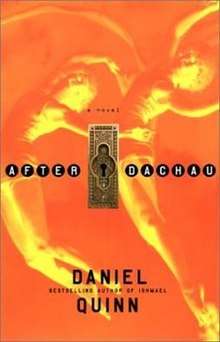After Dachau
After Dachau is a novel written by Ishmael author Daniel Quinn that was published in 2001.

Plot summary
The story is narrated by a young rich man, heir to a huge sum of money. He devotes his life to an organization called "We Live Again" which investigates the reality of reincarnation. People have souls that pass on to other individuals and give them their memories, usually alongside, but sometimes in place of their own memories.
The story focuses on Mallory Gabus, a recently reincarnated woman and her fascinating integration into the new world. She recalls and narrates her experiences and memories of Hitler's victory, which allowed Hitler to bring his desire for an "Aryan" world to fruition. She realizes all that went wrong. The Nazis had won World War II and purged their empire of all non-whites, then rewrote history so as to say that Dachau, a concentration camp, was instead a battle with Adolf Hitler as its hero.
After Hitler's victory, the Third Reich is solely Aryan, the Aryans have killed all non-Aryans in their new empire. They now use A.D. to refer to After Dachau, the turning point in their civilization, and "A.D.-A.D." to refer to our A.D.
Mallory was (re-)born in 1922 A.D.-A.D. as an Afro-American woman in New York.
We find out that the Nazi purges in the Third Reich have started to have a cultural effect on the United States, and soon Jews are being executed. Blacks are being "repatriated", which turns out to mean that they are being placed into concentration camps. Mallory hides out with her lover in the New York City underground and makes a life until their hiding place is discovered by police. At that point, they commit suicide rather than being taken alive or executed.
Jason Tull, the Protagonist, in an attempt to publicize the story and the atrocities the Aryans committed, contacts a newspaper and other news media. His investigation gets him sequestered in an unknown location until he can write three words upon a chalkboard. The words turn out to be "No One Cares", and, as it turns out, no one does.
The narrator explains that he cares, and he doesn't care if others don't care, he is still going to pursue this for his own personal interest. He opens an exhibit displaying relics from the old world, including works by Jewish authors such as Albert Einstein and Sigmund Freud.
The narrator receives a gift from his "uncle" (the man who imprisoned him), and expresses his intent to publish the gift. He opens a shop where he displays pictures of Africans that had been saved in Mallory's hideout.
Finally, one night, someone throws a brick through the gallery's windows, prompting the narrator to conclude that somebody "does care". The last line reveals that the gift is The Diary of a Young Girl, written during World War II, the Diary of Anne Frank.
Major themes
To novice eyes, reincarnation would appear to be a major theme of the book. However, this is not the case. Quinn has stated that he merely used reincarnation as a convenient vehicle for telling his story, and that he does not endorse (or oppose) the idea of reincarnation.
The major theme of this book is the social constructedness of history and of what we take to be the foundations of social reality. In this book, Quinn uses the example of the Holocaust to make his argument - he suggests that had history gone slightly differently (i.e. had the Germans won World War II), we might have been fooled into thinking of a monstrous evil as something not really worth concerning ourselves with. This dovetails with his other work, in that much of Quinn's work focuses on re-telling the conventionally accepted narrative of human progress over the last 10,000 years in a way that he hopes will inspire people to be horrified and realize the need to change course with regard to humanity's relationship to its environment.
Other points made:
1. Capitalism and the progress with it, is a Jewish invention, the Aryan (and a very collectivist) motto being "if it works why change it?"
2. History is written by the winners, and at such a distant point it does not really matter anymore because humans are resigned to bad action, which is explained via "No One Cares."
3. The view of history is a very Neo-Nazi view of the modern world.
4. A person's body does not constitute who they are.
See also
- Axis victory in World War II
The above page includes an extensive list of other Wikipedia articles regarding works of Nazi Germany/Axis/World War II alternate history.